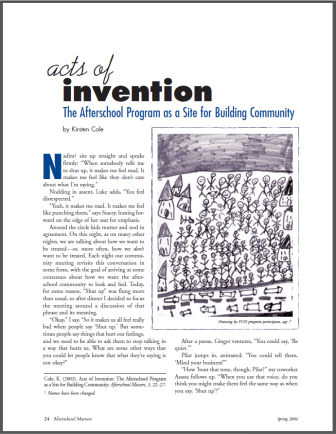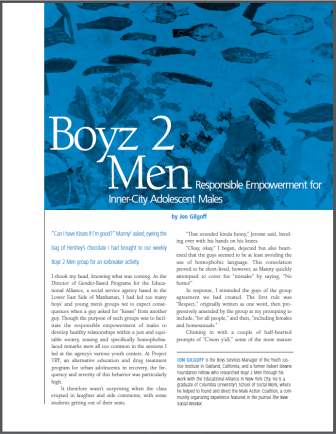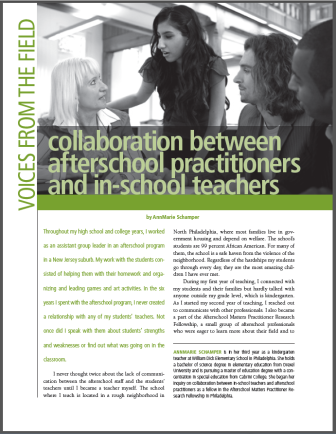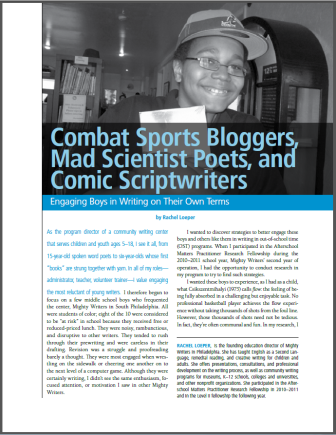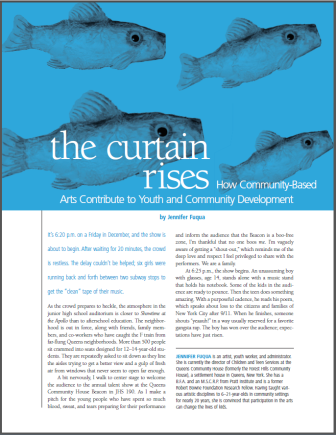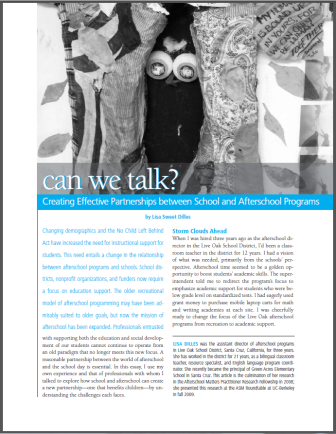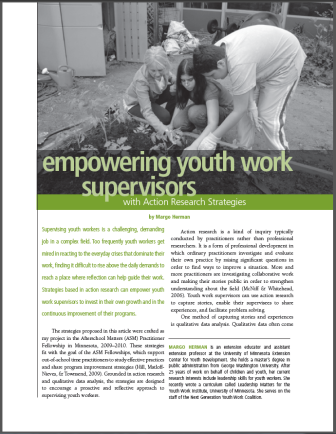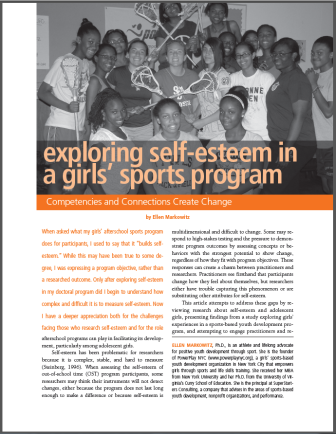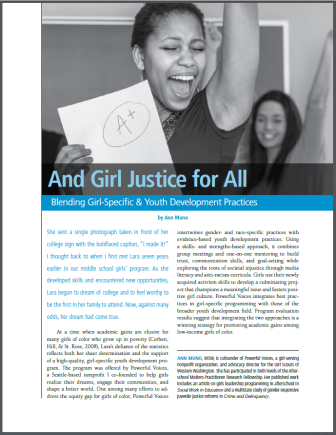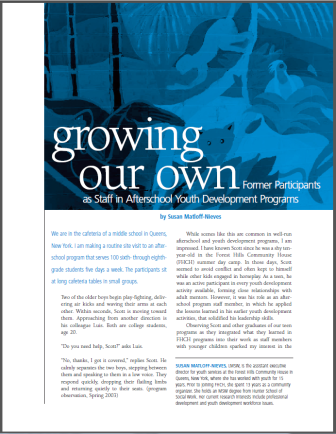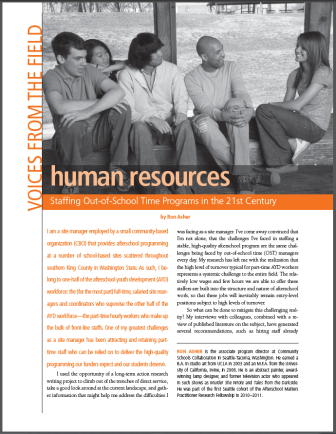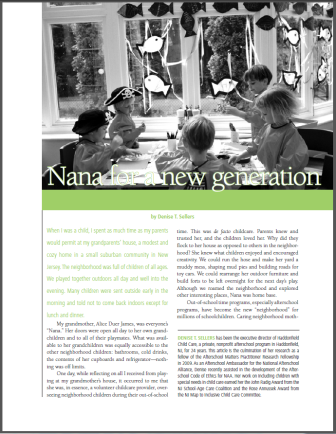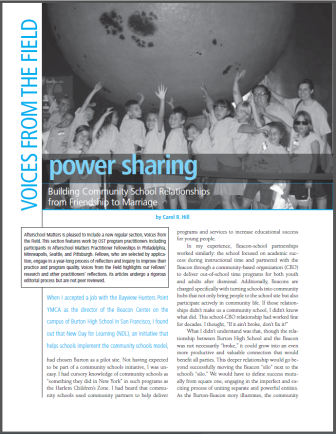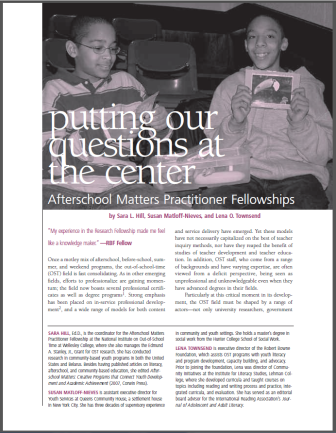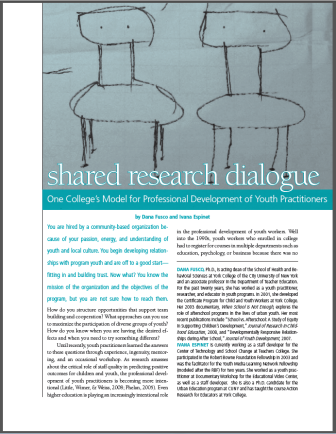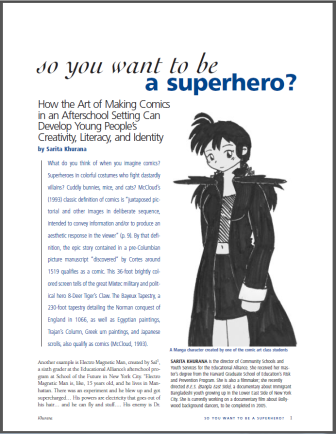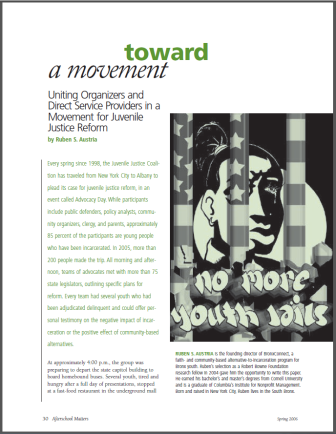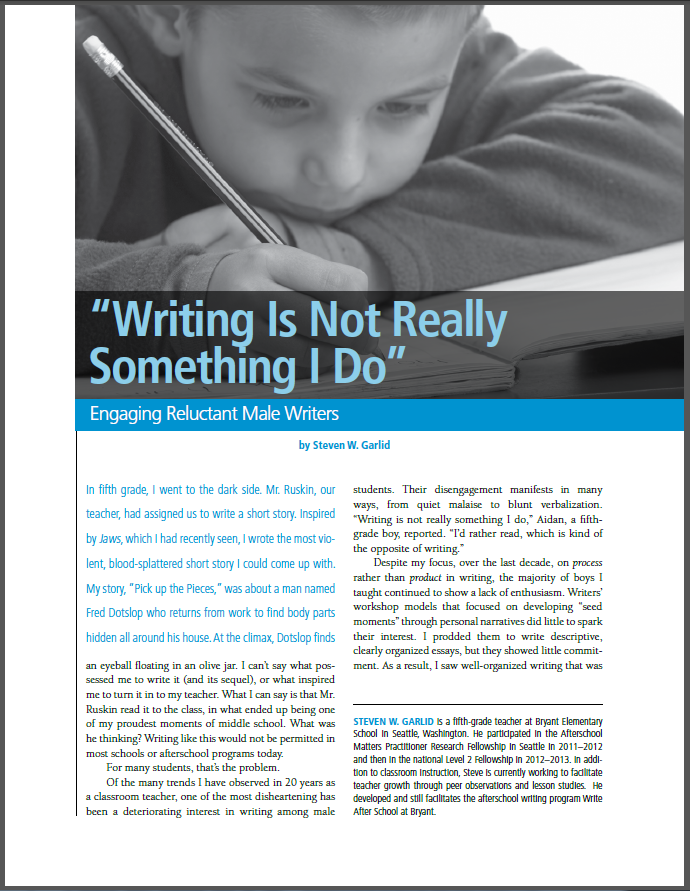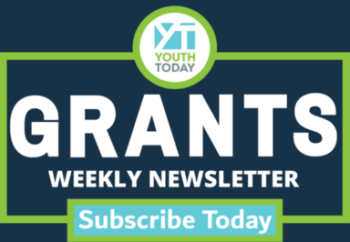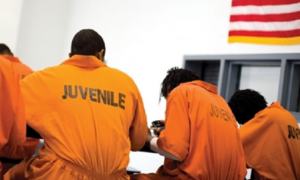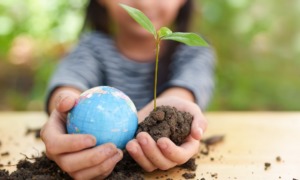Participating Fellows in the National Afterschool Matters Practitioner Fellowship all engage in inquiry about critical and key topics in their own practice. As one of the last activities in the Fellowship, they attend a writing retreat where they reflect on the findings of their inquiry projects, and write them up into an article or other type of piece with the aim of sharing that work with a larger audience. Some of the pieces were submitted to, and accepted in, the journal Afterschool Matters.
Below is an archive of all of the articles which were published by NASM Fellows in the journal.
Return to the Robert Bowne Foundation Legacy
Acts of Invention: The Afterschool Program as a Site for Building Community
Written by Kirsten Cole, this piece describes how an afterschool program can be a space where youth and staff can build community and children and youth learn how to articulate feelings and gain strategies for addressing conflict.
Boyz 2 Men: Responsible Empowerment for Inner-City Adolescent Males
A description of a boys’ group by leader Jon Gilgof, this article discusses the social and emotional needs of young men, and how a gender-based group can support their development.
Collaboration between Afterschool Practitioners and In-School Teachers
This piece by in-school teacher Annmarie Schamper, describes her inquiry into how the afterschool program at her school was different from, and yet complement the school day curriculum. In addition, the piece explores how the two might collaborate with each other.
Combat Sports Bloggers, Mad Scientist Poets, and Comic Scriptwriters
Rachel Loeper of Mighty Writers in Philadelphia describes the unique needs of boys in her program who are reluctant writers, and ways to better engage them in the writing process.
The Curtain Rises: How Community-Based Arts Contribute to Youth and Community Development
This piece written by Jennifer Fuqua, describes her Beacon program, and the many ways that they were able provide opportunities for children and youth to engage in arts. In addition, she describes research that discusses how the arts can support positive youth development.
Can We Talk? Creating Effective Partnerships between School and Afterschool Programs
Lisa Dilles was the afterschool coordinator of two afterschool programs, and wanted to make major changes. This piece describes the challenges that she encountered both from staff as well as from the school principal, and how she engaged the parties in dialogue to accomplish her goals.
Empowering Youth Work Supervisors with Action Research Strategies
Margo Herman describes how engaging youth work supervisors in action research strategies helped to improve their management skills and strategies, as well as supported their development as professionals.
Exploring Self-Esteem in a Girls’ Sports Program Competencies and Connections Create Change
Ellen Markowitz studied how participants in a girls’ sports program improved their social competencies and that through the activities which included work with mentors, made connections with others that helped with their overall social and emotional development.
And Girl Justice for All: Blending Girl-Specific & Youth Development Practices
Ann Muno points to research about the specific needs of girls, and her inquiry into how youth development programs can address these needs through their programming.
Growing Our Own: Former Participants as Staff in Afterschool Youth Development Programs
Susan Matloff Nieves writes about how her program intentionally hires staff who ‘grew up’ in their program as children and youth. However, these young staff need extra support and supervision both as employees as well as young people with development needs.
Human Resources: Staffing Out-of-School Time Programs in the 21st Century
Ron Asher is a supervisor at a 21st Century Community Learning Center. His piece describes the challenges of hiring and keeping staff at his afterschool program. Asher makes the case that the best staff are those already working in schools such as paraprofessionals because they have access to school resources and have developed relationships with students.
Nana for a New Generation
The author Denise Sellers’ “Nana” was grandmother to an entire neighborhood of children. Today, her afterschool program fulfills a similar set of needs for 21st century children and their parents.
Power Sharing: Building Community School Relationships from Friendship to Marriage
Carol Hill writes about the often problemmatic relationship between schools and afterschool programs, and the inequal power relations that are often at the bottom of these tensions. Her article describes how she developed strategies to build community across institutions.
Putting Our Questions at the Center: Afterschool Matters Practitioner Fellowships
This piece by Sara Hill, Lena Townsend, and former fellow Susan Matloff Nieves, describes the philosophical underpinning of the National Afterschool Matters Practitioner Fellowship, as well as the program model and outcomes of the fellowship.
Shared Research Dialogue: One College’s Model for Professional Development of Youth Practitioners
This piece by Dana Fusco and past fellow Ivana Espinet describes a college course, based on the National Afterschool Matters Practitioner Fellowship that engages college students in teacher inquiry.
So You Want to Be a Superhero? How the Art of Making Comics in an Afterschool Setting Can Develop Young People’s Creativity, Literacy, and Identity
Sarita Khurana studied a comic book making workshop in her afterschool program, and how this type of activity engaged youth and promoted their literacy and identity development.
Toward a Movement: Uniting Organizers and Direct Service Providers in a Movement for Juvenile Justice Reform
Very often youth organizers and direct service providers in youth organizations speak different languages and have different perspectives regarding their roles with youth. This article by Ruben Austria makes the case for the two fields to learn from each other and to adapt their practices accordingly.
“Writing Is Not Really Something I Do”, Engaging Reluctant Male Writers
Steven Garlid was an in-school teacher when he participated in the fellowship. As a result of his inquiry into why boys are often unengaged in writing, he created an afterschool writing group, and intentionally designed it to capture boys’ interest.




